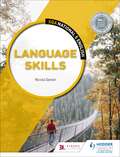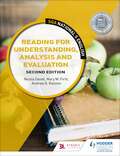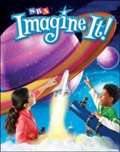- Table View
- List View
SQA National 5 English: Language Skills
by Nicola DanielExam Board: SQALevel: National 5Subject: EnglishFirst teaching: September 2017First exam: Summer 2018Successfully develop the key language skills that students must demonstrate across the National 5 English assessments. Covering reading, writing, talking and listening - vital skills for learning, life and work - this course companion helps students to fulfil their potential at N5 and beyond.- Introduces the language skills required for National 5 English, offering advice for studying and revising these skills throughout the school year- Focuses on strategies for approaching the RUAE and Scottish Texts sections of the exam, providing explanations of command words and different question types, worked examples and practice questions- Takes students step by step through the process of analysing an extract/passage, looking at word choice, imagery, structure and many other linguistic techniques- Improves every student's language skills, with dozens of ready-made and accessible activities, including independent work, group discussion points and extension tasks - with answers provided online at hoddergibson.co.uk/answers-N5-English-Language
SQA National 5 English: Language Skills
by Nicola DanielExam Board: SQALevel: National 5Subject: EnglishFirst teaching: September 2017First exam: Summer 2018Successfully develop the key language skills that students must demonstrate across the National 5 English assessments. Covering reading, writing, talking and listening - vital skills for learning, life and work - this course companion helps students to fulfil their potential at N5 and beyond.- Introduces the language skills required for National 5 English, offering advice for studying and revising these skills throughout the school year- Focuses on strategies for approaching the RUAE and Scottish Texts sections of the exam, providing explanations of command words and different question types, worked examples and practice questions- Takes students step by step through the process of analysing an extract/passage, looking at word choice, imagery, structure and many other linguistic techniques- Improves every student's language skills, with dozens of ready-made and accessible activities, including independent work, group discussion points and extension tasks - with answers provided online at hoddergibson.co.uk/answers-N5-English-Language
SQA National 5 English: Reading for Understanding, Analysis and Evaluation, Second Edition
by Andrew G. Ralston Mary M. Firth Nicola DanielExam Board: SQALevel: National 5Subject: EnglishFirst teaching: September 2017First exam: Summer 2018Offer the best possible preparation for National 5 English RUAE. Building students' confidence in reading unseen texts, this book focuses on the skills required for the exam before progressing to worked examples and full-length practice papers.- Teaches students how to answer every question type effectively and demonstrate their ability to understand ideas, analyse language and structure, and evaluate writers' techniques- Enables students to put their RUAE skills into practice as they tackle a range of short extracts and questions accompanied by active learning approaches, group work and individual tasks- Tests the skills that students have developed through six full-length passages and practice assessments, with answers and marking guidelines provided online at hoddergibson.co.uk/answers-N5-English-RUAE- Provides stretch and challenge opportunities, including extension activities and further reading that will broaden students' Reading for Understanding, Analysis and Evaluation skills
SQA National 5 English: Reading for Understanding, Analysis and Evaluation, Second Edition
by Andrew G. Ralston Mary M. Firth Nicola DanielExam Board: SQALevel: National 5Subject: EnglishFirst teaching: September 2017First exam: Summer 2018Offer the best possible preparation for National 5 English RUAE. Building students' confidence in reading unseen texts, this book focuses on the skills required for the exam before progressing to worked examples and full-length practice papers.- Teaches students how to answer every question type effectively and demonstrate their ability to understand ideas, analyse language and structure, and evaluate writers' techniques- Enables students to put their RUAE skills into practice as they tackle a range of short extracts and questions accompanied by active learning approaches, group work and individual tasks- Tests the skills that students have developed through six full-length passages and practice assessments, with answers and marking guidelines available online at hoddergibson.co.uk/answers-N5-English-RUAE- Provides stretch and challenge opportunities, including extension activities and further reading that will broaden students' Reading for Understanding, Analysis and Evaluation skills
SRA Flex Literacy Interactive Reader, Volume A, Secondary System
by Douglas Fisher Nancy E. Marchand-Martella Ronald C. MartellaNIMAC-sourced textbook
SRA Imagine It! A Karuk Folktale
by Sra Mcgraw-HillImagine It! is a comprehensive Reading and Language Arts program that will teach your children to read, write, and think independently!
SRA Imagine It! Aunt Jade Comes to Visit
by Sra Mcgraw-HillImagine It! is a comprehensive Reading and Language Arts program that will teach your children to read, write, and think independently!
SRA Imagine It! Edward Lear: The Gift of Nonsense
by Sra Mcgraw-HillImagine It! is a comprehensive Reading and Language Arts program that will teach your children to read, write, and think independently!
SRA Imagine It! Mountain Animals
by Sra Mcgraw-HillImagine It! is a comprehensive Reading and Language Arts program that will teach your children to read, write, and think independently!
SRA Imagine It! Almost Moving Day
by Sra Mcgraw-HillImagine It! is a comprehensive Reading and Language Arts program that will teach your children to read, write, and think independently!
SRA Imagine It! Bags or Bank?
by Sra Mcgraw-HillImagine It! is a comprehensive Reading and Language Arts program that will teach your children to read, write, and think independently!
SRA Imagine It! Dog Wash or Craft Sale?
by Sra Mcgraw-HillImagine It! is a comprehensive Reading and Language Arts program that will teach your children to read, write, and think independently!
SRA Imagine It! Finn McCool and Far Rua
by Sra Mcgraw-HillImagine It! is a comprehensive Reading and Language Arts program that will teach your children to read, write, and think independently!
SRA Imagine It! Finn McCool and the Scottish Giant
by Sra Mcgraw-HillImagine It! is a comprehensive Reading and Language Arts program that will teach your children to read, write, and think independently!
SRA Imagine It! From the Beaches to the Deep Ocean Floor: Life in the Sea
by Sra Mcgraw-HillImagine It! is a comprehensive Reading and Language Arts program that will teach your children to read, write, and think independently!



